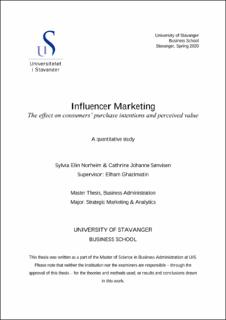| dc.description.abstract | Despite the growing interest in social media influencers and influencer marketing in recent years, there still exists elements to be explored to better understand how consumers are affected by the relatively new marketing strategy. Existing research has examined how consumers are affected when exposed to influencer marketing. However, there are contradicting results as to how consumers’ purchase intentions are affected. Further, to our knowledge, there exists scarce research on how influencer marketing affects consumers’ perceived value. Thus, this master thesis aims to examine whether influencer marketing has a positive effect on consumers’ purchase intentions and consumer perceived value. The thesis is based on theory concerning influencer marketing, consumer behavior, and persuasion knowledge. To examine the effects of influencer marketing, a quantitative research strategy with an experimental research has been used. The experiment conducted involved manipulation of Instagram advertisements, distributed to our own social media community. The results from a sample of 156 respondents was unexpected whereas none of our findings were significant. We have not received support for influencer marketing having a positive effect on consumer purchase intention and perceived value. Furthermore, did persuasion knowledge have a moderating effect, however in contrast to what we expected, did persuasion knowledge have a weakening effect. Hence, all of our hypotheses were rejected. Alternative explanations discussed involve various perspectives consisting of the influencer’s audience, authenticity, and trustworthiness. As well as negative brand resemblance, commercial content and profit-motivated appearance. For both hypotheses, it is relevant to highlight that the findings could be due in part to respondents not deliberately seeking the influencers. By other means, this study chose influencers and brands on behalf of respondents. Despite both hypotheses being rejected and inability to prove a positive effect, the effect still may exist. We thus encourage additional research into the field of influencer marketing to further examine these results. | |
